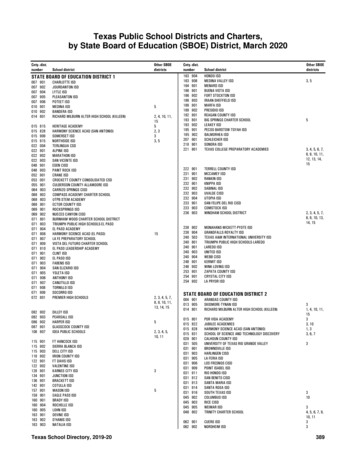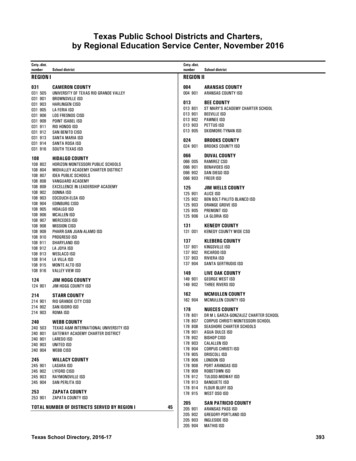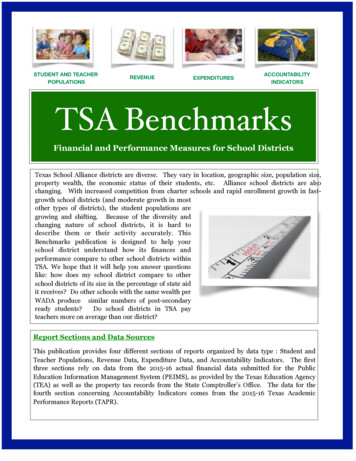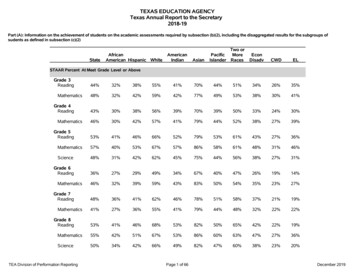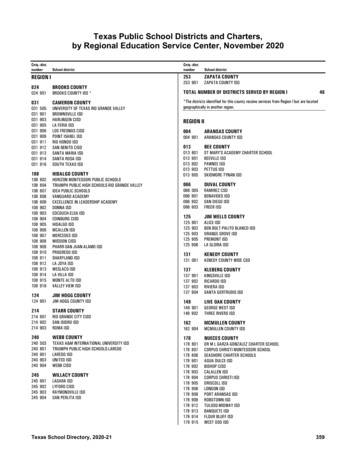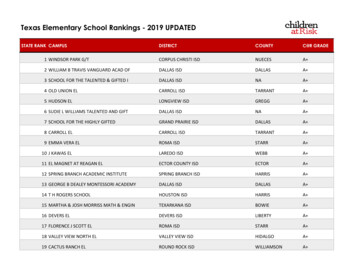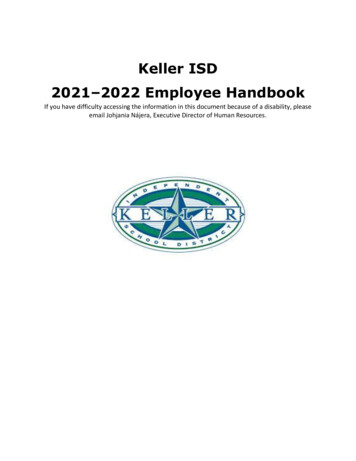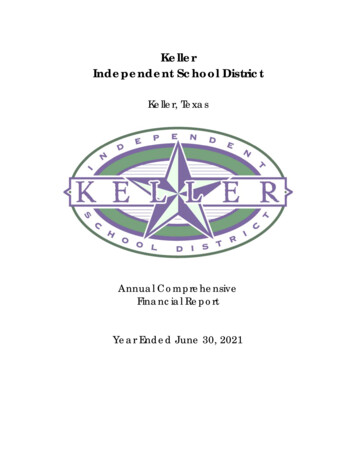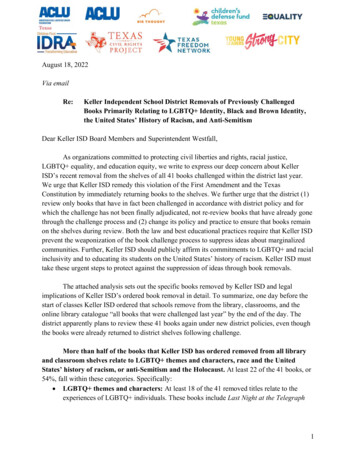
Transcription
August 18, 2022Via emailRe:Keller Independent School District Removals of Previously ChallengedBooks Primarily Relating to LGBTQ Identity, Black and Brown Identity,the United States’ History of Racism, and Anti-SemitismDear Keller ISD Board Members and Superintendent Westfall,As organizations committed to protecting civil liberties and rights, racial justice,LGBTQ equality, and education equity, we write to express our deep concern about KellerISD’s recent removal from the shelves of all 41 books challenged within the district last year.We urge that Keller ISD remedy this violation of the First Amendment and the TexasConstitution by immediately returning books to the shelves. We further urge that the district (1)review only books that have in fact been challenged in accordance with district policy and forwhich the challenge has not been finally adjudicated, not re-review books that have already gonethrough the challenge process and (2) change its policy and practice to ensure that books remainon the shelves during review. Both the law and best educational practices require that Keller ISDprevent the weaponization of the book challenge process to suppress ideas about marginalizedcommunities. Further, Keller ISD should publicly affirm its commitments to LGBTQ and racialinclusivity and to educating its students on the United States’ history of racism. Keller ISD musttake these urgent steps to protect against the suppression of ideas through book removals.The attached analysis sets out the specific books removed by Keller ISD and legalimplications of Keller ISD’s ordered book removal in detail. To summarize, one day before thestart of classes Keller ISD ordered that schools remove from the library, classrooms, and theonline library catalogue “all books that were challenged last year” by the end of the day. Thedistrict apparently plans to review these 41 books again under new district policies, even thoughthe books were already returned to district shelves following challenge.More than half of the books that Keller ISD has ordered removed from all libraryand classroom shelves relate to LGBTQ themes and characters, race and the UnitedStates’ history of racism, or anti-Semitism and the Holocaust. At least 22 of the 41 books, or54%, fall within these categories. Specifically: LGBTQ themes and characters: At least 18 of the 41 removed titles relate to theexperiences of LGBTQ individuals. These books include Last Night at the Telegraph1
Club, winner of the National Book Award for Young People’s Literature, and Fun Home,winner of the Stonewall Book Award and the Lambda Literary Award. Race and the United States’ history of racism: At least 5 of the 41 removed titles relateto Black and brown experiences and the history of racism in this country. 1 These booksinclude The Bluest Eye, by Toni Morrison, and Out of Darkness, winner of the AméricasAward and the Tomás Rivera Mexican American Children’s Book Award. Anti-Semitism and the Holocaust: Keller ISD has ordered the removal of Anne Frank’sDiary: The Graphic Adaptation.Additionally, at least 6 of the removed books not counted among the above include feministthemes.It is deeply concerning that the majority of the removed books center on the history andexperiences of marginalized communities. This is both a disturbing and an unsurprising outcome,since the removals are based on the mere fact that at least one community member objected tothe books. Keller ISD’s removal of books during the pendency of review allows anti-LGBTQ ,racist, and anti-Semitic motivations for removing books—or other motivations aimed directly atthe suppression of ideas—to result in at least temporary removal of books from district shelves.Further, Keller ISD’s removal of these books is not even in accordance with its ownflawed district policy. The books were previously challenged, but the district has not cited a newchallenge as the basis for a new review. Rather, it is as a blanket matter reviewing books thathave recently been judged worthy of return to the shelves. But Keller ISD’s policy adopted onAugust 8, 2022 requires a challenge to initiate the review process.These are serious violations of the First Amendment and of Keller ISD’s own policies forbook evaluation. According to the district’s own legal policy, the district “shall not removematerials from a library for the purpose of denying students access to ideas with which thedistrict disagrees.” Yet, by removing challenged books during the pendency of the reviewprocess, the district has created a process allowing the removal of books based on their ideas. Byremoving all books challenged in the last year, not in accordance with district policy, Keller ISDhas targeted books predominantly about historically oppressed communities for review.As the Supreme Court stated nearly a century ago, “if there is any fixed star in ourconstitutional constellation, it is that no official, high or petty, can prescribe what shall beorthodox in politics, nationalism, religion, or other matters of opinion.” 2 Schools, and inparticular school libraries, must be a place where students have broad access to a wide variety of1All Boys Aren’t Blue, a memoir by queer Black author George Johnson, relates to both LGBTQ andBlack identity and experience. Last Night at the Telegraph Club, a historical novel about a queer ChineseAmerican teenager, relates to both LGBTQ identity and the United States’ history of racism.2West Va. State Bd. of Educ. v. Barnette, 319 U.S. 624, 642 (1943).2
ideas—both the popular and unpopular ones of the moment. Simply put, Keller ISD cannot targetschool library books for increased scrutiny and removal because of disagreement with thecontent and the views the books express. The First Amendment prevents the district fromsuppressing the ideas that LGBTQ people belong, deserve acceptance and inclusion inAmerican society, and have a wide array of life experiences. It likewise prevents the district fromsuppressing messages of racial inclusivity and belonging, or accounts of the United States’ longhistory of racial injustice. The same is true for anti-Semitism and the history of the Holocaust.This is because the comfort of some cannot come at the expense of students’ constitutionalrights.Keller ISD’s removal of these 41 books harms students in the district. It does so both bydirectly suppressing speech and access to ideas and by sending the message to LGBTQ , Black,brown, and Jewish students that Keller ISD rejects their history and belonging in the community.Students perform better, both academically and socially, with access to texts that reflect theiridentities and experiences in the world. 3 Keller ISD states that it values “respect for the diversityof our school community.” 4 To live up to that value and to comply with the First Amendment,the district must take steps to remedy the harms from its actions in removing books.Keller ISD must immediately return the 41 books to the shelves. Moreover, it must keepbooks on shelves during the pendency of the review process and revise its policy to provide foraccess to books during the review process. The district must affirm its commitment to LGBTQ and racial inclusivity and ensuring students have access to books about the history of racism inthe United States and about anti-Semitism. These steps are necessary for Keller ISD to complywith the First and Fourteenth Amendments.Thank you for your attention to this matter. We look forward to your prompt response.Sincerely,American Civil Liberties Union of TexasBig ThoughtChildren’s Defense Fund – TexasEquality TexasIDRA (Intercultural Development Research Association)Texas Civil Rights ProjectTexas Freedom NetworkYoung Leaders, Strong City3See, e.g., Rudine Sims Bishop, “Mirrors, Windows, and Sliding Glass Doors,” in Perspectives:Choosing and Using Books for the Classroom, Vol. 6, No. 3 (summer 1990).4Keller ISD, Core Documents, https://www.kellerisd.net/Page/214.3
Addendum: Legal AnalysisBackground: Book Review and Removals in Keller ISDI.On August 16, 2022, one day before the start of school, Keller ISD’s executive directorof curriculum and instruction directed principals to remove all books challenged in the precedingyear from library and classroom shelves. The district employee also directed librarians to removethe books from online catalogues. Later in the day, the district stated, “Our district is beginningthe process of reviewing these books under the new policies” adopted by the school board at itsAugust 8, 2022 meeting.The policies adopted at the board’s August 8 meeting provide for review of challengedbooks. They do not provide for review of previously challenged books absent a new challenge.At no point has Keller ISD provided any indication that any of the 41 books have beenchallenged anew.A.The Removed BooksThe majority of the removed books—at least 22 of the 41 removed books—relate to theexperiences and history of oppressed communities. These include: At least 18 books that advance LGBTQ inclusion:o Last Night at the Telegraph Club, by Malinda Lo: Winner of the National BookAward for Young People’s Literature, the Stonewall Book Award for YoungAdult Literature, and the Asian/Pacific American Award for Youth Literature.o Fun Home: A Family Tragicomic, by Alison Bechdel: Winner of the StonewallBook Award for Nonfiction and the Lambda Literary Award.o I Am Jazz, by Jazz Jenningso The Breakaways, by Cathy G. Johnsono All Boys Aren’t Blue, by George Johnsono We Are the Ants, by Shaun David Hutchinsono Jack of Hearts (and Other Parts), by L.C. Roseno Weird Girl and What’s His Name, by Meagan Brotherso Infinity Reaper, by Adam Silverao More Happy than Not, by Adam Silverao Flamer, by Mike Curatoo George, by Alex Ginoo Go with the Flow, by Karen Scheemanno Gender Queer, by Maia Kobabeo King and the Dragonflies, by Kacen Callender4
o Keeping You a Secret, by Julie Anne Peterso If You Could Be Mine, by Sara Farizano Tricks, by Ellen HopkinsAt least 5 books about Black, Latinx, and Asian-American identities and the UnitedStates’ history of racism:o The Bluest Eye, by Toni Morrisono Out of Darkness, by Ashley Hope Pérezo 47, by Walter Mosleyo Last Night at the Telegraph Club, by Malinda Loo All Boys Aren’t Blue, by George JohnsonAt least one book about anti-Semitism and the Holocaust:o Anne Frank’s Diary: The Graphic Adaptation, by Ari FolmanAdditionally, Keller ISD has removed at least 6 books with feminist themes, including: Milk and Honey, by Rupi Kaur Moxie, by Jennifer Mathieu This One Summer, by Mariko Tamaki and Jillian Tamaki L8r, g8r, by Lauren Myracle What Girls Are Made Of, by Elana Arnold Red Hood, by Elana ArnoldB.Keller ISD Book RemovalsKeller ISD’s removal of these books disproportionately about historically marginalizedcommunities during the pendency of the review process is inconsistent with the FirstAmendment. Unlike many book review processes in the state, in Keller ISD books are pulled offlibrary shelves for the pendency of the review process. This means that any challenged book—nomatter how frivolous or at odds with the First Amendment the challenge is—is unavailable tostudents for the duration of the review process.For example, in Katy ISD in fall 2021, district parents challenged Jerry Craft’s New Kidand Class Act—part of a series of highly acclaimed graphic novels about Black preteens’experiences in school—specifically because of the ideas they contain about difficulties related toinclusivity and belonging that Black students face, such as microaggressions. Along with thebook challenges, parents started a petition to seek to cancel a speaking event in the district byMr. Craft. The parent who started the petition explained that she did so because she views Mr.Craft’s books as promoting “critical race theory and Marxism.” She said, “He discussesmicroaggressions, which is a racial term coined by the conceptual founders of critical race5
theory. That let me know the ideology of these books.” 5 The two books follow a preteen Blackstudent who enrolls at a private school and experience exclusion based on race and class. Theyare loosely based on Mr. Craft’s life and his sons’ lives. Plot lines include characters joining theschool soccer team, arguing over Halloween costumes with friends, and navigatingmicroaggressions like school staff misnaming Black students and peers seeking to touch Blackstudents’ hair. During the pendency of this review plainly triggered by the goal of removing theideas the books contain, the book remained off library shelves entirely.Such action is unconstitutional. The the First Amendment does not permit the removal ofbooks from school libraries, or restriction of access to them, based on the ideas that they contain.II.Keller ISD’s Book Removal Practices Violate the First AmendmentMore than 40 years ago, the Supreme Court held that “local school boards may notremove books from their school library shelves simply because they dislike the ideas containedin those books.” Bd. of Educ., Island Trees Union Free Sch. Dist. No. 26 v. Pico, 457 U.S. 853,872 (1982) (plurality opinion). Keller ISD recognizes that this Supreme Court case controls thedistrict’s actions in decisions regarding the removal of library materials. The district’s own legalpolicy explains, citing Pico: “Students’ First Amendment rights are implicated by the removal ofbooks from the shelves of a school library. A district shall not remove materials from a libraryfor the purpose of denying students access to ideas with which the district disagrees.” 6 Yet KellerISD regularly removes books from the shelves during reviews triggered by the books’ content;has singled out books about LGBTQ inclusivity, race and racism, and the Holocaust for reviewand removal or restriction. Keller ISD has in fact deviated from policy in removing 41 suchbooks, the majority of which are about such themes. This is a plain violation of the FirstAmendment of the U.S. Constitution and its state corollary, Article I, Section 8 of the TexasConstitution, as well as Keller ISD policy.A.Keller ISD’s Book Removals Are Inconsistent with the Supreme Court’sDecision in PicoAs the Supreme Court explained in Pico, school districts may not “seek by [books’]removal to prescribe what shall be orthodox in politics, nationalism, religion, or other matters ofopinion.” 457 U.S. at 872. Importantly, school districts cannot exercise discretion over librarycontents “in a narrowly partisan or political manner.” Id. at 870. For example, “if an all-whiteschool board, motivated by racial animus, decided to remove all books authored by [Black5Hannah Dellinger, How Did 400 Katy ISD Parents Get a Book Removed? Accusations of Marxism and‘Critical Race Theory,’ Houston Chronicle, Oct. 6, 2021, SD-to-cancel-16512034.php.6Keller ISD EF (Legal) Policy, Instructional Resources at 1 (Oct. 14, lename EF(LEGAL).pdf.6
authors] or advocating racial equality and integration,” doing so would plainly violate the FirstAmendment. Id. at 871.In Pico, taking into account such evidence, the Supreme Court reversed a decision thathad ended the case in favor of the district. Id. at 875. The Court explained, “The evidence plainlydoes not foreclose the possibility that petitioners’ decision to remove the books rested decisivelyupon disagreement with constitutionally protected ideas in those books, or upon a desire . . . toimpose upon the students . . . a political orthodoxy to which [the school board] and theirconstituents adhered.” Id. Although the school board in Pico was able to cherry-pick excerptsfrom many of the disfavored books containing vulgar or sexually explicit language, the SupremeCourt held that the school board nevertheless violated the First Amendment if they “intended bytheir removal decision to deny [students] access to ideas with which [the board members]disagreed, and if this intent was the decisive factor in [the school board’s] decision.” Id. at 871.The Supreme Court also emphasized that the school board failed to use “established, regular, andfacially unbiased procedures” for reviewing the book, noting that evidence that the book“removal procedures were highly irregular and ad hoc” could undercut the district’s claims ofviewpoint neutrality. Id. at 874.Keller ISD’s book removals directly contravene the settled principles of Pico. Keller ISDis removing books from the shelves for content-based reasons—because review is sought basedon their content. The district appears to have targeted and permitted the targeting of books thatare related to themes of LGBTQ inclusivity, racism, racial inclusivity, and anti-Semitism. Andit has done so contrary to policy, with no evidence that a new challenge has been filed. Theremovals in Keller ISD suppress students’ access to the ideas that books contain. Pico and KellerISD’s own policy are clear: Keller ISD cannot remove books from libraries due to the ideas theyexpress.B.Keller ISD’s Book Removals Are Inconsistent with Post-Pico Cases,Including Cases on Censorship of LGBTQ BooksFollowing Pico, courts within the Fifth Circuit and throughout the country havereaffirmed these principles. As the Fifth Circuit has explained, “In light of the special role of theschool library as a place where students may freely and voluntarily explore diverse topics, [a]School Board’s non-curricular decision to remove a book well after it had been placed in thepublic school libraries evokes the question whether that action might not be an unconstitutionalattempt to ‘strangle the free mind at its source.’” Campbell v. St. Tammany Par. Sch. Bd., 64F.3d 184, 190 (5th Cir. 1995) (quoting West Va. State Bd. of Educ. v. Barnette, 319 U.S. 624,637 (1943).7
Both in the Fifth Circuit and throughout the country, courts have affirmed that the FirstAmendment’s prohibition on viewpoint-based censorship of library books includes a prohibitionon viewpoint-based censorship of books because they express support for lesbian, gay, bisexual,and transgender people. E.g., Case v. Unified Sch. Dist. No. 233, 908 F. Supp. 864, 875 (D. Kan.1995) (holding that the removal from school libraries of a book depicting romance between twowomen violated the First Amendment); Parents, Fams., & Friends of Lesbians & Gays, Inc. v.Camdenton R-III Sch. Dist., 853 F. Supp. 2d 888, 897 (W.D. Mo. 2012) (holding that censorshipof LGBT-supportive websites in a school library violated the First Amendment). For example,more than two decades ago, the Northern District of Texas held that the removal of twochildren’s picture books about LGBTQ inclusion from the children’s section of the WichitaFalls Public Library, and the enactment of a city resolution on book removal procedures tofacilitate the books’ removal, were “impermissible content-based and viewpoint-baseddiscrimination” in violation of the First Amendment. Sund v. City of Wichita Falls, Tex., 121 F.Supp. 2d 530, 548 (N.D. Tex. 2000). This logic applies with equal force today, including toKeller ISD’s removal of books furthering LGBTQ and racial inclusion and discussing racism inthe United States.The ACLU has previously successfully sued to restore books to school libraries. Forexample, In Our Mothers’ House is a children’s picture book about three adopted children andtheir two mothers. In one lawsuit, a school district had removed it for “advocacy ofhomosexuality.” In response to the litigation, the school district ultimately agreed to restore thebook to the shelves and allow it to be checked out on the same terms as any other children’sbook, and to pay 15,000 in attorneys’ fees. 7***When a school “board has used its official power to perform an act clearly indicating thatthe ideas contained in the [books] are unacceptable and should not be discussed or considered,”that “message is not lost on students and teachers, and its chilling effect is obvious.” Pratt v.Indep. Sch. Dist. No. 831, 670 F.2d 771, 779 (8th Cir. 1982). Keller ISD has done just that—indicated that the ideas in reviewed and removed books are unacceptable. Keller ISD’s bookremovals are a plain violation of the First Amendment, and of the Texas Constitution and districtpolicy.We urge that Keller ISD remedy this violation of the First Amendment, the TexasConstitution, and Keller ISD’s own policy as swiftly as possible by keeping books on the shelvesduring the pendency of the review process and by implementing policy and training to prevent7See Joshua Block, School Promises In Settlement To Stop Removing Library Books For ‘Advocacy ofHomosexuality,’ Jan. 31, 2013, -homosexuality.8
internal reviews from targeting books based on the ideas they contain. Any challenges shouldproceed in accordance with district policy. Further, the district should publicly commit toLGBTQ and racial inclusivity and ensuring students have access to the United States’ history ofracism and racial injustice in Keller ISD libraries. Keller ISD’s removal of 41 books and itstargeting of books on marginalized communities for removal have created a chilling effect onstudents and teachers that must be remedied.9
3 Keller ISD states that it values "respect for the diversity of our school community."4 To live up to that value and to comply with the First Amendment, the district must take steps to remedy the harms from its actions in removing books. Keller ISD must immediately return the 41 books to the shelves. Moreover, it must keep

